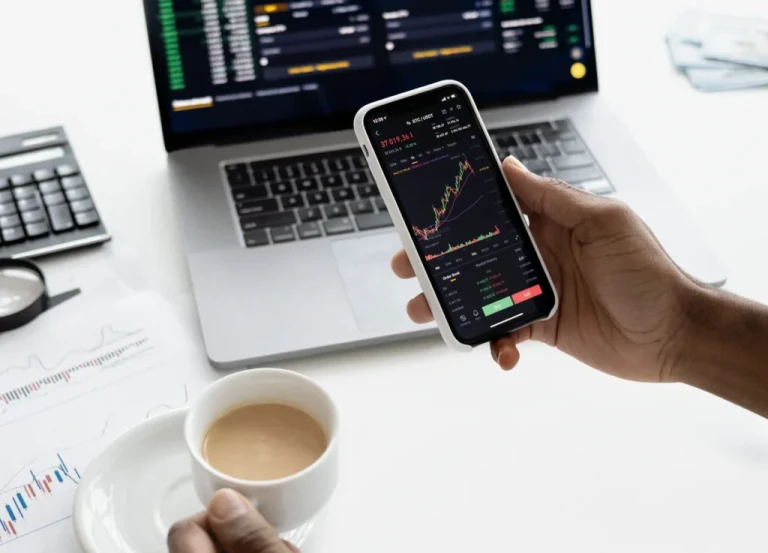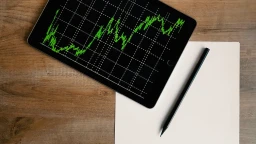Difference between Demat and Trading Account

For those just getting started in the world of stocks and shares, the terms ‘demat account’ and ‘trading account’ may sound interchangeable. In this article, we will explore the key differences between a demat and trading account so that you can better understand how they work.
What is a Demat Account?
A demat account is an account where investors can hold and trade their investments in electronic format. The main benefit of a demat account is that it eliminates the need for physical documents, which can be lost or stolen. Demat accounts also make it easier to track your investments and transactions.
There are many benefits of having a demat account, including:
Convenience: All your shares are held in one place electronically, so you don’t have to worry about keeping track of physical share certificates.
Ease of trading: Buying and selling shares is much easier when everything is done electronically.
Safety: Having your shares in a demat account means they are much less likely to be lost or stolen.

What is a Trading Account?
When it comes to investing in the stock market, one of the first things you need to do is open a trading account. This is an account with a broker that allows you to buy and sell shares. A demat account is simply a way to hold your shares in an electronic format. When you want to buy shares, the broker will execute the trade and then credit the shares to your demat account. Similarly, when you want to sell shares, the broker will debit the shares from your demat account and execute the trade.
Additionally, there are many benefits of having a Trading account. Such as,
1. Ease of transactions:
A trading account makes it easy to buy and sell securities. This is because the broker can quickly transfer money from the account to pay for the securities purchased, and can just as easily transfer money from the sale of securities back into the account.
2. Access to credit:
A trading account can give the account holder access to credit, which can be used to purchase securities.
3. Margin privileges:
A trading account usually comes with margin privileges, which allow the account holder to buy securities with borrowed money. This can be a useful way to increase potential profits, but it also increases risk.
4. Discounts on commissions:
Many brokers offer discounts on commissions for accounts that trade frequently. This can save the account holder money over time.
If you’re interested in investing in the stock market, then you’ll need to open both a demat and trading account.
Demat account vs Trading Account
A demat account is an account where shares and securities are held in an electronic form. A trading account is an account through which transactions in shares and securities take place.
The main difference between a demat and a trading account is that in a demat account, shares and securities are held in an electronic form, while in a trading account, transactions in shares and securities take place.
Another difference between the two accounts is that a demat account can be opened with any depository participant (DP), while a trading account has to be opened with a broker.
In India, most brokers offer both demat and trading accounts. So, if you want to trade in stocks, you will need to open both types of accounts.
Also Read: How is Currency Valued?
Can I have a Demat Account without a Trading account?
It is not mandatory to have a trading account to open a demat account. However, most of the banks and stockbrokers offer a bundled account opening service wherein they provide both demat and trading services. Further, it may not be cost effective to open a demat account without a trading account.
Can I have a Trading account without a Demat account?
A Demat account is not mandatory for trading in India. You can have a trading account without a Demat account. In this case, you will have to deliver the shares physically to the broker, who will then hold them in his own Demat account.
Charges Applicable:
A demat account is required to hold shares in an electronic format and is opened with a DP. A trading account is required to trade in shares on a stock exchange.
The charges for a demat account are:
– Dematerialisation charges: A fee charged by the depository participant (DP) for converting physical shares into electronic form.
– Annual Maintenance Charges (AMC): An annual fee charged by the DP for maintaining the account.
– Transaction charges: A fee charged by the DP for each transaction made in the account, i.e., whenever shares are bought or sold.
The charges for a trading account are:
– Brokerage: A fee charged by the broker for each trade executed on behalf of the trader.
– Account opening charges: A one-time fee charged by the broker for opening a new trading account.
– Annual Maintenance Charges (AMC): An annual fee charged by the broker for maintaining the account.









